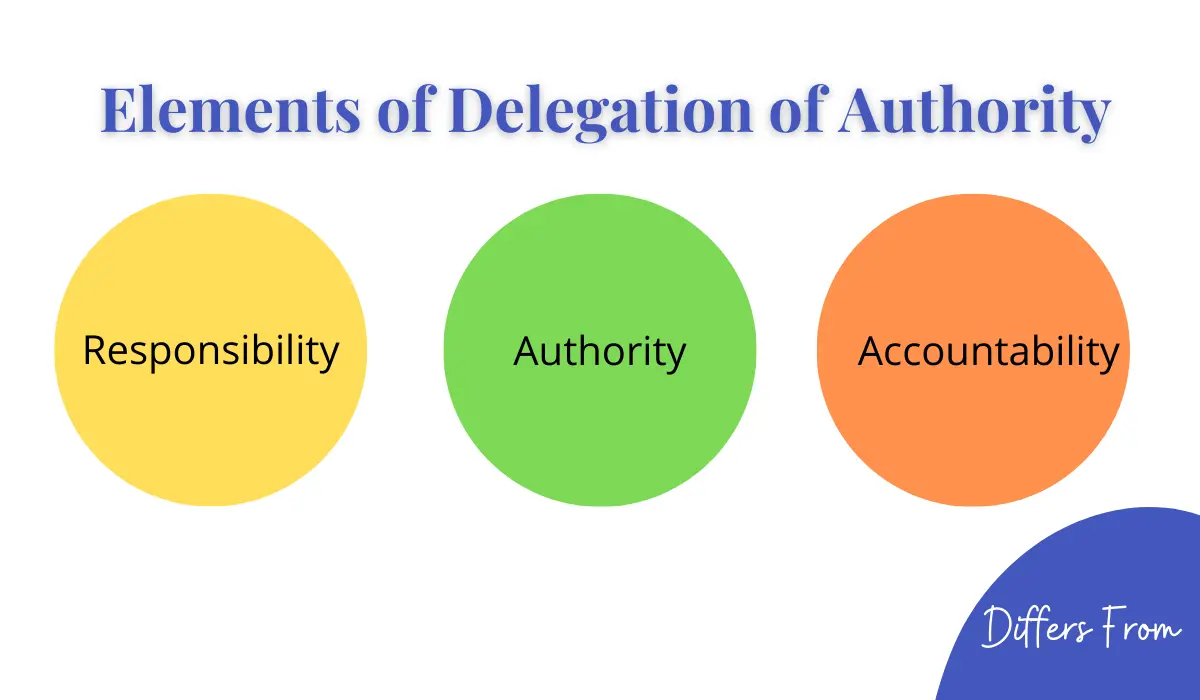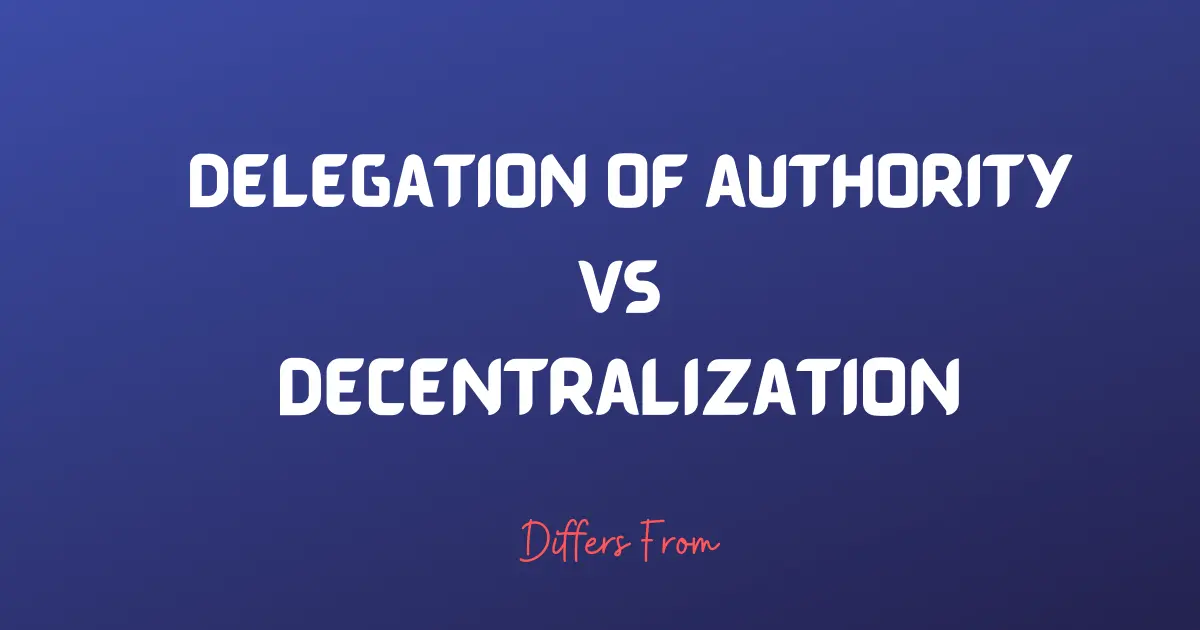Decentralization has come to be seen as a way to improve organizational efficiency and creativity. Delegation of authority, on the other hand, can lead to more accountability and better decision-making. In this article, we will explore the difference between delegation of authority and decentralization in detail to clear up the confusion.
Define Delegation of authority:
The process of delegating responsibility for work to another employee is known as Delegation of authority or Centralization. The division of work and decision-making power to a person who reports to a leader or manager is called Delegation of authority. It is the organizational method through which a manager divides his or her labor among all of their employees.
Advantages of Delegation of authority
Reduce Managers’ Workload
Managers’ burden is reduced when authority is delegated. It relieves the management of the need to perform trivial or routine tasks. They can delegate regular and routine tasks to subordinates while concentrating more efficiently on managerial and creative activities.
Advantages of Specialization
In a fast-paced workplace, specialization is the key to success. Management delegates authority and responsibility to subordinates based on their abilities and knowledge. Because the task is delegated to individuals with particular knowledge and expertise, it aids in providing specialized services.
Morale and motivation
Delegation of authority fosters a sense of status and prestige among subordinates. It could also be used to motivate the subordinate. As a result, subordinates frequently respond positively to delegated authority.
Development and Training
Delegation of authority lays the groundwork for subordinate training and growth. It guarantees that people in the firm enhance their ability to take on new and more difficult responsibilities and promotes job happiness.
Allows for Growth and Expansion
Delegation of authority supports business growth and expansion. It allows for greater organizational structure flexibility. When given power over their difficulties, subordinates can examine the situation and make appropriate judgments.
Better and faster decision
The delegating method allows for decision-making to be pushed. Making decisions at the lowest level when information, skill, and decision-making willingness are available. Delegating authority results in faster and better decisions.
Disadvantages of Delegation of authority
Inadequate Training or Skill:
It is not enough to assign and instruct an employee to complete a task. The individual must be adequately trained and have the necessary abilities to complete the assignment successfully.
Moral Issues:
Delegation can be difficult for the person to whom it is delegated. If people believe they are being asked to execute a task only because the boss dislikes it or finds it unpleasant, they are unlikely to contribute to the Delegation’s success.
Lack of Authority:
Some tasks necessitate a particular level of authority to do. For example, this authority may manifest itself as the ability to get funding or gain the cooperation of personnel in other departments.
Lack of Experience:
An individual lacking organizational experience may avoid an allocated work even if he possesses the requisite abilities and training.
Perfectionism:
Another barrier to delegating is perfectionism on the part of the manager or supervisor. Again, demanding that the task be completed exactly as the boss or supervisor would do might cause problems with Delegation.
Elements of Delegation of authority
- Responsibility is a subordinate’s obligation to do the assigned duty correctly. When a superior gives a task to a subordinate, it is the subordinate’s responsibility to complete the task.
- The power to make decisions is referred to as authority. Decisions can be made on how to use resources and whether or not to do something.
- Accountability refers to the subordinate’s responsibility to his superior for his work performance. In other words, when a superior assigns a job/work or responsibility to his subordinates, he also provides the authority, which makes workers (subordinates) accountable to their superior for work performance.

Methods of delegating authority
1. Make use of Emotional Intelligence
A skilled gambler will be intimately familiar with each team member’s strengths and limitations. As a result, they can outsource duties to individuals best suited for them with little to no supervisory oversight. As a result, these delegators gain more time, reduce stress, and create possibilities for themselves to focus on larger, more critical issues.
2. Highlight initiative
Delegated tasks should be viewed through the prism of the employee’s professional leadership development plan. Delegate authority by praising the initiative and always give credit where credit is due. By emphasizing initiative and offering credit, you demonstrate to delegates that their contributions are recognized and respected. As a result, employees will be motivated to continue expanding their professional skills, and it will eventually help them manage themselves.
3. Be an Effective Listener
When delegates execute tasks, always be aware of their thoughts and feelings. A manager can actively solve problems and streamline the workflow by understanding their challenges. In addition, incorporating empathy into your leadership style by listening to delegates’ views might bring new insights into developing and refining company procedures.
4. Delegate Power Wisely
One issue gambler-type delegators confront is decentralizing the corporation by allowing their different delegates too much autonomy. This allows each delegate to do their work following their vision and style, resulting in outputs that do not fit together cohesively. Throughout a task, teach your personnel to ensure they are operating within the same context and that their efforts complement one another.
5. Responsible Delegation of Duties
Another disadvantage of being too hands-on is that it can result in a manager running around like a firefighter, fixing numerous emergencies, and managing crises for your delegates as they work through increasingly difficult issues. Because delegates will rely on their boss to clean up their messes, managers might soon become overburdened, leaving them with insufficient energy to drive the organization toward a consolidated objective.
Define Decentralization
Decentralization is distributing or delegating an organization’s functions, particularly those involving planning and decision making, away from a central authoritative location or group.
Advantages of Decentralization
1. Lightens the load on top executives:
Decentralization relieves top executives of the stress of fulfilling several functions. The entire burden is placed on the shoulders of an executive and his immediate group when authority is centralized.
2. Facilitates diversification:
Decentralization facilitates the diversity of products, activities, and markets, among other things.
3. To provide product and market emphasis:
When new products enter the market due to innovations or changes in customer demand, a product loses market share.
4. Executive Development:
When authority is dispersed, executives in the organization can develop their talents by taking the initiative and preparing them for managing positions.
5. It encourages motivation:
“Decentralization fosters the establishment of small cohesive groupings,” according to Louis A. Allen. Local managers tend to weld their staff into tightly knit integrated groups because they are given high authority and autonomy.”
Disadvantages of Decentralization
1. Coordination Issues:
Because authority is scattered throughout the organization, decentralization of authority causes coordination issues.
2. Increased Financial Load:
Decentralization necessitates hiring trained employees to accept authority, which adds to the financial burden, and a small business cannot afford to hire experts in multiple sectors.
3. Require Qualified Workers:
Decentralization is ineffective if qualified and competent personnel are unavailable.
4. Conflict:
Due to decentralization, divisional leaders are under increasing pressure to maximize profits at any cost. Meeting their new profit plans frequently causes disagreements among managers.
Difference between Delegation of Authority and Decentralization
| Delegation | Decentralization |
| Delegation means handing over authority from one person of high level to a person of low level. | Decentralization is the final outcome achieved. |
| Technique of management | Philosophy of management |
| The delegation has a narrow scope as there is limited transfer of authority. | Decentralization is wider in scope as there is a wide distribution of authority. |
| Delegation is complete when there is a transfer of authority from one person to another. | It is complete when authority is delegated to the fullest possible extent. It is the end result of delegation. |
| Power to control delegated tasks vests with the delegator. | Power to control is delegated to lower-level managers. |
Centralization vs Decentralization: In Video
Key Summary: Delegation of Authority vs Decentralization
- Delegation transfers authority but not accountability. Decentralization transfers all three.
- Delegation gives subordinates less work freedom than decentralization.
- Delegation is the process by which a superior assigns tasks and responsibilities to subordinates and immediately vests part of his decision-making authority in them. Decentralization refers to the structural dispersal of decision-making authority in various organizational operations in the form of semi-autonomous units.
Conclusion
While under decentralization, the power of control is exerted by the head of the unit to whom authority has been assigned, in the delegation, the final control over the operations of the organization lies with the top executive. A delegation is a form of organizational structure.
We hope you understand the difference between delegation of authority and decentralization. If you are benefited, you may share it with your friends.

